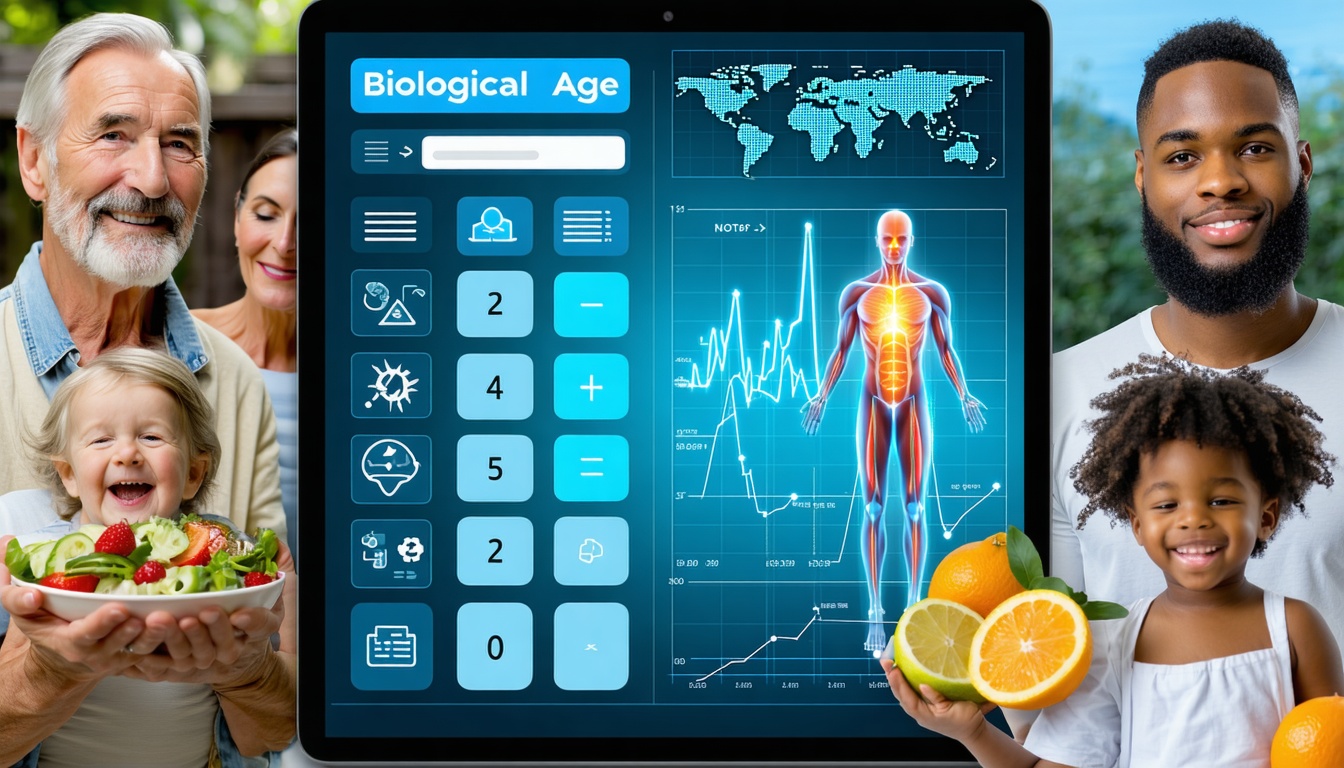Understanding Biological Age
Definition and Significance
Biological age is like your body’s own clock, ticking away at its own pace, showing how much wear and tear you’ve accumulated over the years. It’s not just about counting birthdays; it’s about how your body is holding up. This age can give you a sneak peek into how long and how well you might live. It’s like a health report card, showing how your diet and lifestyle choices are affecting your aging process (DrAlexisShields).
Think of biological age as a crystal ball for your health. It can hint at how likely you are to face certain health issues like heart disease, diabetes, cancer, or Alzheimer’s. For instance, when folks land in the ICU, their biological age can be a better predictor of survival than just knowing how many candles were on their last birthday cake. Tools like PhenoAge can tell you more about who might make it out of the hospital than just knowing their chronological age (PubMed Central).
Factors Influencing Biological Age
A bunch of things can speed up or slow down your biological clock, like your genes, how you live your life, and the world around you. Knowing these can help you make choices that might keep you feeling younger for longer.
-
Genetics: Your DNA is like a blueprint for how fast you age. Some genes, like the APOE gene, are linked to living longer and can affect your aging speed (Cleveland Clinic).
-
Lifestyle Choices: What you eat, how much you move, and how you handle stress can really change your biological age. Eating foods packed with antioxidants, staying active, and managing stress can help you age more gracefully. Check out our articles on biological age and diet and biological age and exercise for more tips.
-
Environmental Factors: The world around you, like the air you breathe and the products you use, can speed up aging. Smoking, pesticides, and chemicals in personal care products can all add years to your biological age. Dive into our articles on biological age and smoking and biological age and pesticides to learn more.
-
Health Markers: There are certain signs in your body that can tell you about your biological age. Things like how much oxygen you can use, your grip strength, inflammation levels, kidney function, gut health, telomere length, and DNA changes are all clues. These markers show what’s happening inside as you age.
| Factor | Impact on Biological Age |
|---|---|
| Genetics | Sets your aging pace |
| Diet | Healthy eating slows aging |
| Exercise | Keeps you aging well |
| Stress Management | Cuts down on cell damage |
| Environmental Exposure | Speeds up aging with pollutants |
| Health Markers | Show body changes |
By getting a handle on what biological age means and what affects it, you can take charge of your health. Check out our articles on biological age assessment tools and how to calculate biological age to find out how to measure your biological age and make smart lifestyle choices.
Tools for Assessing Biological Age
So, you’re curious about your biological age, huh? Well, you’re in luck because there are some nifty tools out there that can give you the lowdown on how your body’s holding up. Two of the big players in this game are the PhenoAge Calculator and the Aging.AI Calculator. These bad boys use different tricks to figure out your biological age, giving you a peek into your health and how long you might stick around.
PhenoAge Calculator
Let’s talk PhenoAge Calculator, cooked up by Dr. Steven Horvath and his crew. This gizmo is all about the epigenetic clock theory of aging. Basically, it predicts how old you are on the inside by looking at methylation from a simple blood test. Think of methylation like rust on your cells’ pipes—it messes with their mojo and speeds up aging. We’re talking gray hair, wrinkles, and creaky joints.
What’s cool about the PhenoAge Calculator is that it’s got a knack for predicting hospital mortality better than just counting birthdays. This is a big deal for folks in critical condition, as PhenoAge can tell apart those who make it out of the hospital from those who don’t (PubMed Central). Plus, PhenoAgeAccel, a spin-off from the calculator, links up with chronic health issues and a higher chance of kicking the bucket.
| Feature | Description |
|---|---|
| Developer | Dr. Steven Horvath |
| Basis | Epigenetic clock theory |
| Method | Blood test results |
| Key Insight | Predicts hospital mortality |
Want to know how to crunch your biological age numbers? Check out our guide on how to calculate biological age.
Aging.AI Calculator
Next up, the Aging.AI Calculator, whipped up by Insilico Medicine. This one’s a breeze to use for figuring out how fast you’re aging. Just punch in your blood test values, and it spits out your biological age (DrAlexisShields).
The Aging.AI Calculator is super user-friendly, making it a hit for folks wanting a quick peek at their biological age. By crunching those blood test numbers, it gives you a snapshot of your health and aging journey.
| Feature | Description |
|---|---|
| Developer | Insilico Medicine |
| Basis | Blood test values |
| Method | Input blood test results |
| Key Insight | Quick estimate of biological age |
Curious about other ways to measure your biological age? Dive into our article on biological age assessment tools.
Both the PhenoAge Calculator and the Aging.AI Calculator are like your personal health detectives, helping you get a grip on your biological age. With these tools, you can start making moves to boost your health and maybe even add a few more candles to your birthday cake. For more on how your lifestyle can shake up your biological age, check out our reads on biological age and diet and biological age and exercise.
Impact of Lifestyle on Biological Age
Your lifestyle choices are like the secret sauce to keeping your biological age in check. By making smart moves with what you eat and how you move, you can give your biological age a nudge in the right direction and boost your health.
Diet and Biological Age
Eating right is like hitting the jackpot for keeping your biological age young. Studies show that folks who stick to the Mediterranean diet (MeDi) often have a younger biological age than those who don’t eat as healthily. This diet is all about loading up on fruits, veggies, whole grains, nuts, and healthy fats like olive oil.
| Diet Type | Biological Age Impact |
|---|---|
| Mediterranean Diet | -0.07 SD younger PhenoAge per 1-point increase in MeDi score |
| Unhealthy Diet | Higher biological age |
The PhenoAge algorithm, which measures biological aging, shows that each 1-point bump in the Mediterranean diet score is linked to a 0.07 standard deviation (SD) drop in PhenoAge. So, even small tweaks in your diet can make a noticeable dent in your biological age.
For more on how what you eat affects your biological age, swing by our article on biological age and diet.
Exercise and Biological Age
Getting off the couch and moving around is another biggie for keeping your biological age in check. Leisure time physical activity (LTPA) has been shown to seriously lower biological age. Compared to couch potatoes, those who get their sweat on with high levels of LTPA had a 0.31 SD younger PhenoAge (NCBI).
| Activity Level | Biological Age Impact |
|---|---|
| High LTPA | -0.31 SD younger PhenoAge |
| Sedentary | Higher biological age |
Folks who are more into physical activity had a mean PhenoAge that was 3.62 years younger than their actual age, showing just how much regular exercise can slow down biological aging.
To get the lowdown on how exercise can keep your biological age young, check out our article on biological age and exercise.
By mixing a good diet with regular exercise, you can shave years off your biological age and feel better overall. For more tips on figuring out your biological age, head over to our guide on how to calculate biological age.
Stress Management and Biological Age
Effects of Chronic Stress
Chronic stress is like that annoying song you can’t get out of your head—it just keeps playing and playing, and before you know it, it’s messing with your groove. It can sneakily speed up your biological age, making you feel older than you are. How? By messing with your DNA telomeres, those little caps at the end of your chromosomes that keep everything in check. When stress hangs around too long, it shortens these telomeres, messes with your genes, and leaves your immune system feeling like it’s been through a blender. It’s like your body’s on high alert all the time, and that constant tension wears you down.
| Factor | Impact on Biological Age |
|---|---|
| Telomere Shortening | Speeds up aging |
| Increased Methylation | Changes gene behavior |
| Compromised Immune System | More likely to get sick |
But don’t worry, you can fight back! Keeping stress in check is key to staying young at heart. Try some chill-out techniques like mindfulness, meditation, or just getting up and moving. These can help you dodge the nasty effects of stress. Want to know more about how stress messes with your biological age? Check out our article on biological age and stress.
Positive Stress and Aging
Not all stress is the bad guy. There’s a kind of stress that’s actually good for you—think of it as stress with benefits. It’s called eustress, and it can help keep you young. Things like working out, fasting, or even braving a cold shower can give your body a boost and help manage stress in a good way.
| Positive Stressor | Benefit |
|---|---|
| Exercise | Fixes up your cells |
| Fasting | Cleans out the old cells |
| Temperature Extremes | Makes you tougher |
These good stressors get your body ready to handle whatever life throws at it. For example, regular exercise not only gets you fit but also helps your cells repair themselves, keeping you feeling spry. And fasting? It’s like a spring cleaning for your body, getting rid of the old and making way for the new.
Adding these positive stressors to your life can help keep your biological age in check. For more tips on managing stress and its effects on aging, take a peek at our articles on biological age and exercise and biological age and diet.
Getting a handle on how stress affects your biological age is a big deal for your health. By keeping chronic stress at bay and welcoming the good kind of stress, you’re taking a big step toward staying young and living longer.
Genetic Factors and Biological Age
APOE Gene and Longevity
Let’s talk about the APOE gene, especially the APOE-ɛ4 allele, which has a big say in how long you might stick around. This gene can mess with your biological age, making you feel older than you are. The APOE-ɛ4 allele is like that friend who always brings drama—it’s linked to diseases that speed up aging and can cut your time short (NCBI). Knowing your genetic story can help you figure out what health curveballs might come your way.
| APOE Allele | Associated Health Risks |
|---|---|
| APOE-ɛ2 | Lower risk of Alzheimer’s disease |
| APOE-ɛ3 | Neutral |
| APOE-ɛ4 | Higher risk of Alzheimer’s disease, cardiovascular diseases |
Getting the scoop on your APOE genotype can guide you in making smart choices about your health and how you live your life. For more on how your genes play into aging, check out our piece on biological age and longevity.
Epigenetic Clocks
Epigenetic clocks are like those fancy watches that tell more than just time—they estimate your biological age by looking at DNA methylation levels. These clocks are pretty good at matching up with your actual age and can even predict health outcomes like the risk of dying, cancer, and Alzheimer’s disease (NCBI).
Some of the big names in the epigenetic clock world are the Hannum, Horvath, Levine, and Lu clocks. They’ve been tested on a bunch of different folks and are pretty spot-on when it comes to guessing your biological age.
| Epigenetic Clock | Correlation with Chronological Age | Mean Deviation from Chronological Age |
|---|---|---|
| Horvath | r = 0.96 | 3.6 years |
| Hannum | r = 0.91 | 4.9 years |
The Horvath and Hannum clocks are like the fortune tellers of the health world—they can predict your risk of dying from any cause, even more accurately than traditional risk factors. They’re especially good at predicting cancer risks, showing a clear link between higher DNAmAge and cancer.
These clocks are handy for figuring out your biological age and seeing how your lifestyle choices affect your aging process. Want to know how to calculate your biological age? Head over to our article on how to calculate biological age.
By digging into the genetic factors that shape your biological age, you can get a better grip on your health and make choices that might help you stick around longer. For more on what biological age means, take a look at our article on biological age definition.
Future of Biological Age Research
Machine Learning Algorithms
Machine learning is shaking things up in the world of biological age research. These smart algorithms sift through mountains of data to give you a pretty solid guess at your biological age. We’re talking prediction accuracy that can be as tight as 0.87 years or as loose as 4.76 years, with R² values from 0.25 to 0.94. In plain speak, these algorithms are like your health’s crystal ball, offering a peek into your biological age with impressive precision.
Take epigenetic clocks, for instance. These are like the rock stars of ML algorithms, using DNA to estimate your epigenetic age. Clocks like Hannum, Horvath, Levine, and Lu have shown they can predict health outcomes better than your old-school models, including risks for things like cancer and Alzheimer’s (NCBI). Horvath and Hannum clocks, in particular, are top of the class with high age correlations (r = 0.96 for Horvath and r = 0.91 for Hannum) and small mean deviations from your actual age (3.6 and 4.9 years, respectively).
| Epigenetic Clock | Age Correlation (r) | Mean Deviation (Years) |
|---|---|---|
| Horvath | 0.96 | 3.6 |
| Hannum | 0.91 | 4.9 |
These clocks don’t just stop at predicting your age; they can also forecast your risk of kicking the bucket, regardless of the usual suspects like smoking or high blood pressure. They’re especially good at predicting cancer risks, showing a clear link between higher DNAmAge and cancer. Curious about figuring out your biological age? Check out our guide on how to calculate biological age.
Metabolomics-Based Predictors
Metabolomics-based predictors are another exciting frontier in biological age research. These predictors use data from your urine to whip up scores like the Metabolic Age Score. This score has been linked to health issues like kidney problems, high blood sugar, and high triglycerides, regardless of your actual age (NCBI).
Metabolomics is all about diving into the tiny molecules that keep your body ticking. By studying these metabolites, researchers can get a handle on your metabolic health and biological age. The Metabolic Age Score, for example, gives you a snapshot of your metabolic health and flags potential health risks.
| Clinical Outcome | Correlation with Metabolic Age Score |
|---|---|
| Kidney Malfunction | High |
| High HbA1c Levels | Moderate |
| Hyperglyceridemia | Moderate |
As metabolomics research keeps pushing forward, these predictors will get sharper and more on point, giving you a clearer picture of your biological age and health. For more on biological age assessment tools, swing by our article on biological age assessment tools.
The future of biological age research is looking up, with machine learning and metabolomics-based predictors leading the charge. These cutting-edge tools are here to help you take the reins of your health and make smart choices to boost your longevity. Dive into how lifestyle affects biological age in our articles on biological age and diet and biological age and exercise.






